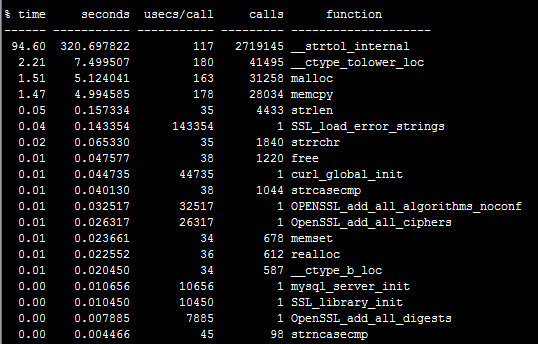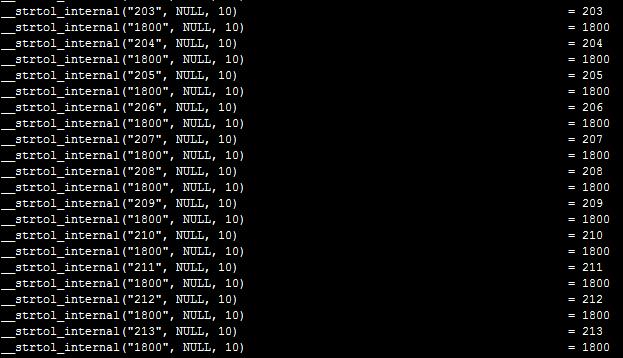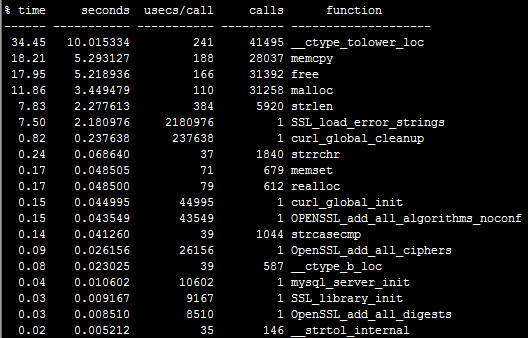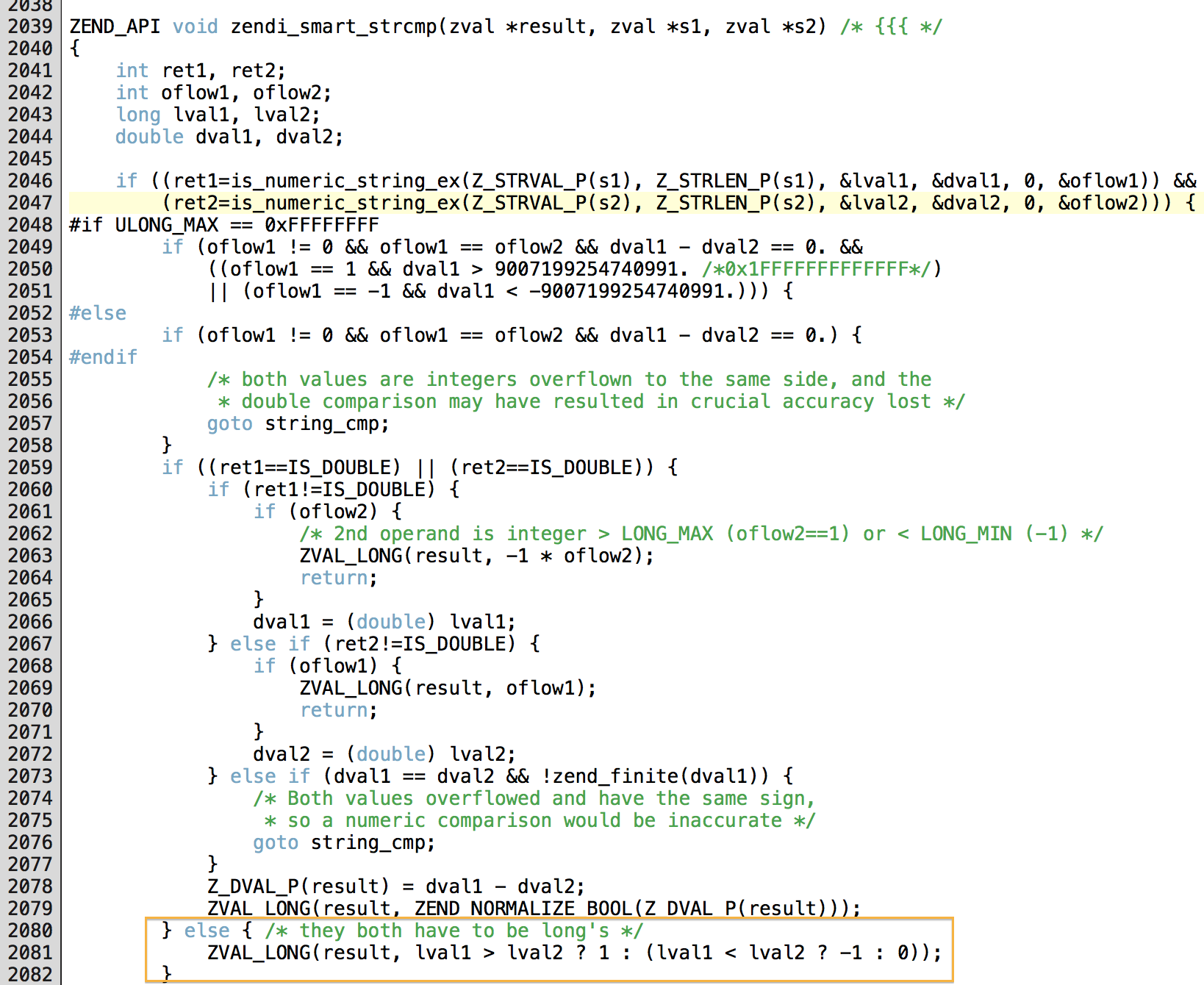Encountering low performance issues with PHP's in_array
PHP performance is improving all the time. However, if you use it improperly or if you are not careful, you may still step into the pitfalls of PHP's internal implementation. I encountered a performance problem a few days ago.
This is what happened. A colleague reported that one of our interfaces took 5 seconds to return each time. We reviewed the code together and were "surprised" to find that a read cache was called in the loop (about 900 times). operation, but the cached key has not changed, so we moved this code outside the loop and tested again. The interface return time dropped to 2 seconds, woohoo! Although it has doubled, it is obviously not a result we can accept!
The amount of code where the performance problem occurred was not large. After we eliminated the IO problem, we wrote a piece of test code, and sure enough, the problem reappeared quickly.
<?php
$y="1800";
$x = array();
for($j=0;$j<2000;$j++){
$x[]= "{$j}";
}
for($i=0;$i<3000;$i++){
if(in_array($y,$x)){
continue;
}
}
?>shell$ time /usr/local/php/bin/php test.php
real 0m1.132s
user 0m1.118s
sys 0m0.015s
Yes, we are using string numbers, This is what it looks like when taken out of the cache! So here it is specially converted into a string (if it is a number directly, this problem will not occur, you can verify it by yourself). It can be seen that the time consumed is 1 second, which is only 3000 cycles. The subsequent sys time is also destined that we will not get any effective information using strace.
shell$ strace -ttt -o xxx /usr/local/php/bin/php test.php
shell$ less xxx

We only see that the delay between these two system calls is very large, But you don’t know what you did? I am at a loss. Fortunately, in addition to strace, the debugging tools under Linux also include ltrace (of course, there are also dtrace and ptrace, which are beyond the scope of this article and will be omitted).
Quote: strace is used to track the system calls or signal generation of a process, while ltrace is used to track the process of calling library functions (via IBM developerworks).
In order to eliminate interference factors, we directly assign $x to the form of array(“0″,”1″,”2″,…) to avoid excessive malloc calls affecting the results. Execute
shell$ ltrace -c /usr/local/php/bin/php test.php
Figure 2

We see that the library function __strtol_internal is called very frequently, reaching 94%, too Exaggerated. Then I checked what this library function __strtol_internal does. It turns out to be an alias for strtol. Simply put, it converts a string into a long integer. It can be guessed that the PHP engine has detected that this is a string type. Numbers, so we hope to convert them into long integers for comparison. This conversion process consumes too much time. We execute again:
shell$ ltrace -e "__strtol_internal" /usr/local/php/bin/php test.php
We can easily catch a large number of calls like the picture below. At this point, the problem is found, in_array For comparison, the two character strings will be converted into long integer types before comparison, but I don't know that the performance is consumed in this.

Now that we know the crux of the problem, we have many solutions. The simplest one is to add the third parameter to in_array to be true, which means it becomes a strict comparison and also compares types. This avoids PHP being too clever. Converting the type is indeed much faster. The code is as follows:
<?php
$y="1800";
$x = array();
for($j=0;$j<2000;$j++){
$x[]= "{$j}";
}
for($i=0;$i<3000;$i++){
if(in_array($y,$x,true)){
continue;
}
}
?>shell$ time /usr/local/php/bin/php test.php real 0m0.267s user 0m0.247s sys 0m0.020s
Many times faster! ! ! It can be seen that the sys time consumption has hardly changed much. When we ltrace again, we still need to assign $x directly to eliminate the interference of malloc calls. Because in our actual application, we pull it out from the cache at once, so there is no such loop in the sample code to apply for memory.
Execute again
shell$ ltrace -c /usr/local/php/bin/php test.php
As shown below:

__ctype_tolower_loc takes up the most time! I checked what the library function __ctype_tolower_loc does: the simple understanding is to convert strings into lowercase, so does this mean that in_array comparison strings are not case-sensitive? In fact, this function call has little connection with our in_array. Regarding the implementation of in_array, it is better to take a look at the source code of PHP. I will probably understand it more thoroughly
In the evening, I read the following source code of PHP 5.4.10. in_array is so interesting, haha, located at line 1248 of ./ext/standard/array.c, you can see that it calls the php_search_array function. The array_serach below also adjusts this, but the last parameter is different! After some tracking, in the case of in_array loose comparison, he finally called the function zendi_smart_strcmp (really a "smart" function) for comparison, located in ./Zend/zend_operators.c. We used ltrace to convert a large number of captured data into integers. The operation is the behavior of is_numeric_string_ex.

The function is_numeric_string_ex is defined in ./Zend/zend_operators.h. After a bunch of judgments and conversions, strtol is called on line 232, which is the system function we mentioned in the article. Convert the string into a long integer, there are pictures and the truth

For more articles related to the low performance problem of in_array in PHP, please pay attention to the PHP Chinese website!

Hot AI Tools

Undresser.AI Undress
AI-powered app for creating realistic nude photos

AI Clothes Remover
Online AI tool for removing clothes from photos.

Undress AI Tool
Undress images for free

Clothoff.io
AI clothes remover

Video Face Swap
Swap faces in any video effortlessly with our completely free AI face swap tool!

Hot Article

Hot Tools

Notepad++7.3.1
Easy-to-use and free code editor

SublimeText3 Chinese version
Chinese version, very easy to use

Zend Studio 13.0.1
Powerful PHP integrated development environment

Dreamweaver CS6
Visual web development tools

SublimeText3 Mac version
God-level code editing software (SublimeText3)

Hot Topics
 1386
1386
 52
52
 Alipay PHP SDK transfer error: How to solve the problem of 'Cannot declare class SignData'?
Apr 01, 2025 am 07:21 AM
Alipay PHP SDK transfer error: How to solve the problem of 'Cannot declare class SignData'?
Apr 01, 2025 am 07:21 AM
Alipay PHP...
 Explain JSON Web Tokens (JWT) and their use case in PHP APIs.
Apr 05, 2025 am 12:04 AM
Explain JSON Web Tokens (JWT) and their use case in PHP APIs.
Apr 05, 2025 am 12:04 AM
JWT is an open standard based on JSON, used to securely transmit information between parties, mainly for identity authentication and information exchange. 1. JWT consists of three parts: Header, Payload and Signature. 2. The working principle of JWT includes three steps: generating JWT, verifying JWT and parsing Payload. 3. When using JWT for authentication in PHP, JWT can be generated and verified, and user role and permission information can be included in advanced usage. 4. Common errors include signature verification failure, token expiration, and payload oversized. Debugging skills include using debugging tools and logging. 5. Performance optimization and best practices include using appropriate signature algorithms, setting validity periods reasonably,
 Describe the SOLID principles and how they apply to PHP development.
Apr 03, 2025 am 12:04 AM
Describe the SOLID principles and how they apply to PHP development.
Apr 03, 2025 am 12:04 AM
The application of SOLID principle in PHP development includes: 1. Single responsibility principle (SRP): Each class is responsible for only one function. 2. Open and close principle (OCP): Changes are achieved through extension rather than modification. 3. Lisch's Substitution Principle (LSP): Subclasses can replace base classes without affecting program accuracy. 4. Interface isolation principle (ISP): Use fine-grained interfaces to avoid dependencies and unused methods. 5. Dependency inversion principle (DIP): High and low-level modules rely on abstraction and are implemented through dependency injection.
 How to automatically set permissions of unixsocket after system restart?
Mar 31, 2025 pm 11:54 PM
How to automatically set permissions of unixsocket after system restart?
Mar 31, 2025 pm 11:54 PM
How to automatically set the permissions of unixsocket after the system restarts. Every time the system restarts, we need to execute the following command to modify the permissions of unixsocket: sudo...
 How to debug CLI mode in PHPStorm?
Apr 01, 2025 pm 02:57 PM
How to debug CLI mode in PHPStorm?
Apr 01, 2025 pm 02:57 PM
How to debug CLI mode in PHPStorm? When developing with PHPStorm, sometimes we need to debug PHP in command line interface (CLI) mode...
 Explain the concept of late static binding in PHP.
Mar 21, 2025 pm 01:33 PM
Explain the concept of late static binding in PHP.
Mar 21, 2025 pm 01:33 PM
Article discusses late static binding (LSB) in PHP, introduced in PHP 5.3, allowing runtime resolution of static method calls for more flexible inheritance.Main issue: LSB vs. traditional polymorphism; LSB's practical applications and potential perfo
 How to send a POST request containing JSON data using PHP's cURL library?
Apr 01, 2025 pm 03:12 PM
How to send a POST request containing JSON data using PHP's cURL library?
Apr 01, 2025 pm 03:12 PM
Sending JSON data using PHP's cURL library In PHP development, it is often necessary to interact with external APIs. One of the common ways is to use cURL library to send POST�...
 Explain late static binding in PHP (static::).
Apr 03, 2025 am 12:04 AM
Explain late static binding in PHP (static::).
Apr 03, 2025 am 12:04 AM
Static binding (static::) implements late static binding (LSB) in PHP, allowing calling classes to be referenced in static contexts rather than defining classes. 1) The parsing process is performed at runtime, 2) Look up the call class in the inheritance relationship, 3) It may bring performance overhead.




